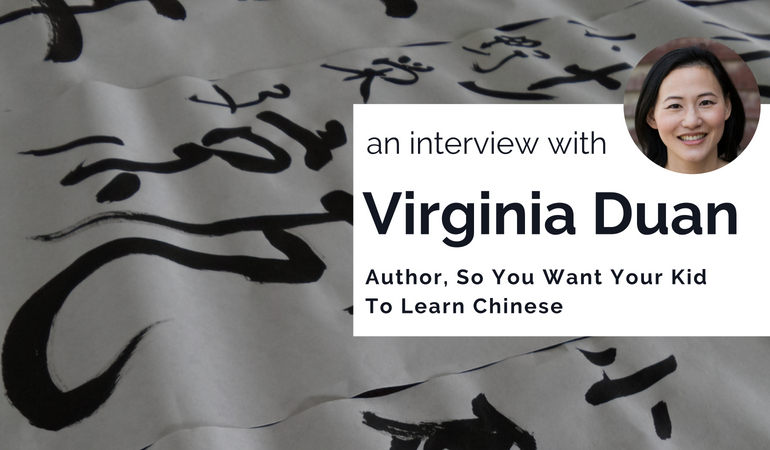This article is part of our Spotlight on Chinese American Authors. Sign up for our newsletter to receive family-friendly activity, recipe and craft ideas throughout the year!
After our son was born, my wife and I were overwhelmed by the resources available to help kids learn Chinese. There were Chinese nursery song recordings for nap time and bilingual daycares promising basic vocabulary, Chinese nannies who could arrange afternoon playdates and brochures from immersion schools promising a path toward fluency.
During those early sleepless days, we lacked not only the tools to evaluate the many options, but also guidance about answering more fundamental questions. How important was it to our family that our son learn Chinese? And to what level of proficiency? How did we hope he would benefit?
Considering language raised weightier issues than those presented by strollers and changing tables. There was the preservation of the family Cantonese dialect, the issue of identity and membership among the local and global community of Chinese speakers. There was the nagging worry that, if we didn’t start immediately, bilingualism would never happen at all.
To explore these issues and more, I recently spoke with Virginia Duan, author of So You Want Your Kid To Learn Chinese and an administrator of the Raising Bilingual Children in Chinese and English Facebook group. A native Californian, Virginia homeschools her four children in Mandarin Chinese and blogs about her experience at Mandarin Mama.
Virginia is a proponent of teaching children Chinese through an immersive Chinese Language Ecosystem, which prioritizes speaking and listening comprehension before reading and writing. The goal is to accelerate language acquisition during early childhood, so that the ability to communicate keeps pace with what is experienced in the world while growing up.
Before implementing a specific plan, however, Virginia encourages parents to honestly evaluate the importance of learning Chinese and create realistic expectations for what their kids can learn. Before filling out enrollment forms or placing a big Amazon order, pause to ask the questions, Do you want your child to learn Chinese? If so, how much? And, why?
Our conversation focused on navigating the day-to-day challenges of teaching kids Chinese in an English-dominant environment. Acknowledging life’s inevitable ebbs and flows, Virginia suggests ways to avoid pitfalls that can sabotage your Chinese acquisition efforts and provides support with practical, actionable advice.
Virginia generously shared her perspective as an author, educator and parent. She explains the unique challenges posed by Chinese as a tonal language, highlights the benefits of creating a Chinese Language Ecosystem at home and suggests ways to achieve your family’s Chinese language goals. These are edited excerpts from our conversation.
Compared to languages like Spanish and French, which are commonly taught in American schools, what makes learning Chinese uniquely challenging in an English-dominant environment?
First of all, learning to speak Chinese is very different than learning to become literate. In terms of speaking, it’s difficult because of the multiple tones involved. For Spanish and French, yes, there are certain words that are tough to pronounce, but they’re still Romance languages with tons of words that are are borrowed or have similar roots. Spanish and French are in the same neighborhood, but Chinese, as a tonal language, is totally different. There are so many homonyms, so many words that seem to sound the same, but which don’t sound the same to a fluent speaker.
Once you grasp the tones, however, learning Chinese isn’t actually that bad. The grammar is easy. There’s no verb conjugation. Everything is contextual. Chinese is actually very easy in that sense. If you get the tones, it’s not a hard language to speak and understand.
Now, if you add in literacy in a non-Chinese environment, then it becomes very, very difficult. To be literate, you need about 2-3,000 characters to read a newspaper. To be highly educated, you need 5-6,000. And there are about 40,000 characters in all. Some of them are easy because they’re pictograms, but then they get harder and harder. It’s really difficult to learn Chinese quickly enough as a child for the things that you’re reading to keep your interest as you get older.
Growing up, the majority of the time you’re using Chinese is with your family. Or maybe you went to Chinese school. It’s very elementary stuff. You’re just learning the things that are pertinent to your life, which pretty much covers sleeping, eating, pooping and other basic things. So, there’s this problem of vocabulary and terminology, which is all learned as an English speaker through your culture, society and surroundings. That’s what’s missing when you learn Chinese in a different context. If you learn it in Taiwan or China, then it’s everywhere around you. You would learn all the technical vocabulary you need to sound like a normal adult.
What level of Chinese language proficiency do you hope that your children reach? How do you hope they benefit?
I want my children to be as close to native as I can get them. I actually don’t think it’s possible, but I would like them to be. I would like it to take several conversations for someone to figure out that they’re not from Taiwan or China. I don’t expect them to know obscure terms, but I definitely want them to be literate in terms of being able to read a newspaper. I don’t think it will happen, perhaps the older two will get further than the younger two. That’s just how stuff happens. The oldest siblings don’t have any competing languages around, but by the time the younger kids arrive, the English has already started. And of course English is the lingua franca here.
And, why? My children are multi-ethnic, so they are half-Chinese, 1/4 Japanese and 1/4 German. I think that by virtue of being Asian in America, you’re always considered foreign, you’re never considered here. And then, whenever you go back to China or Taiwan, you’re also always considered foreign. You’re not really Chinese unless you’re speaking.
So, the main driving reason, other than being able to communicate with my family, is that I don’t ever want anyone to say that they do not belong somewhere. It’s actually probably driven by rage. I don’t have to worry about their English, there’s no way they’re not ever going to be fluent, but I don’t want anyone to ever say that they’re not Chinese. Especially because they are only half-Chinese. I don’t want it to mess with their identity or for them to feel like they’re not really Chinese.
What connection do you see between language transference and cultural transference for traditions like food, festivals and family activities?
Language and culture are definitely interlinked, but I’m not very good about it because I can’t actually say that I’m very knowledgable about many of the traditions, unless it’s something I just absorbed through family life. This is where I feel like teachers and books are great and I am not very useful.
In terms of how they are linked, there are so many ways. For example, you cannot understand English literature without understanding the Bible. You can’t understand Western culture without the lens of also understanding religion. That’s how I kind of see it. You can’t really understand the Chinese language without understanding a part of the culture, too. They evolved side by side.
There are lot of phrases and idioms, things that are randomly referred to in conversation. If someone says to you in English, “I’ll never reach the pearly gates,” it means nothing to you culturally, if you don’t understand the Bible. It’s the same way with Chinese.
In terms of language acquisition and retention, you’ve called the system used in immersion schools and Saturday Chinese schools outdated due to its initial focus on reading and writing. Instead, you’re a proponent of creating a Chinese Language Ecosystem (CLE) that focuses on speaking and listening comprehension. What is a CLE and what are its primary benefits?
The term Chinese Language Ecosystem was coined by Oliver Tu. I felt like it very nicely encapsulated my thinking, so it was nice to actually have a term for it!
Traditionally, people teach speaking and reading at the same time. And that makes sense at a school. You can’t really test comprehension very well. It’s kinda fluffy, versus saying, “the kids know X number of characters.” I totally understand that thinking. The problem is that there are just too many characters you need to learn to be literate. It’s not like English, when you can kind of figure out how phonics work, then just read whatever. With Chinese, you either know a character or you don’t. It’s very inefficient, if your goal is to learn a language.
Let’s be practical and real here. The goal of a language to be able to communicate and I feel like it’s so much easier to learn how to speak and understand Chinese, than it is to read it. The majority of kids in America don’t need to read Chinese, especially when you can’t really apply what you learn. What use is it to read one out of 10 characters? You still don’t know what you’re reading about. You’re still actually illiterate. I feel like it’s a poor use of time.
The idea of a Chinese Language Ecosystem is to recreate and mimic being in China or Taiwan as closely as possible, to the extent financially feasible and to the best of your ability. How do people learn a language? They’re surrounded by it. The easiest way to learn a language is just to be in it. The primary emphasis of a Chinese Language Ecosystem is just to be surrounded by the language. The idea is that everything you listen to, that you watch, that someone is speaking to you, anything that requires listening, should be in Chinese. As much as you can stand!
A common complaint is, “My kids don’t ever speak Chinese.” That’s when I would say that it’s because we haven’t provided enough Chinese for them. A kid probably has the perfect vocabulary for eating, sleeping and pooping. Basic functions. But by the time kids reach age 8, they start to like stuff. If they don’t have the Chinese words for something, they can’t express it.
Can you think something if you don’t have the word for it? It’s a philosophical question, but applied to language acquisition, how can someone say something without knowing the word for it? Of course it’s going to come out in English or whatever language is dominant! That’s why sometimes even for bilingual Chinese speakers, it gets too fast and words still come out in English.
We’re asking kids to construct a skyscraper with only a hammer. How can they talk about anything they’re interested in, when all they can do is talk about daily life? That’s why the Chinese Language Ecosystem is so important. You have to expose kids to not just stories, but also to news, traffic, science and business in real life situations.
How does learning Chinese through childhood in a Chinese Language Ecosystem compare with learning Chinese in a traditional educational environment?
I’m not quite sure, because there hasn’t been enough time — Mandarin immersion is still a little bit new. But I would say that I think a CLE is a little more natural in terms of the vocabulary you acquire and can apply in a non-classroom environment. The main problem, I think, when I’ve encountered Mandarin immersion kids who are not from native speaking families is that they can’t have spontaneous conversations. If it doesn’t follow a script or something they’re really familiar with, then it’s very difficult. It’s like when you learn travel guide book phrases like, Where is the bathroom? and, How much is this? But when you go off that script, then you’re just like, “Argh!”.
It’s not really a fair comparison. In school, you have to teach to the mean — you can’t leave the five kids having problems behind and you can’t just teach to the top five kids, either. You have to be able to measure, test and show parents what the kids can do. I have no solution for this, but it explains why the Chinese can only be so narrowly applied. In general, I feel like it’s very theoretical and not very practical. If you’re learning Chinese in an environment like a native speaker, however, it’s just what you know. Like muscle memory.
Given the amount of time and resource investment required, you advocate setting realistic expectations and aligning on an appropriate priority level for learning Chinese. What’s your best advice for parents, in terms of matching expectations and priorities?
As a parent, there are all these things you think you want your kids to have, then there’s the actual doing of it. So I would say, depending on your abilities and language level, you have to start by being honest with yourself about who you are and who your partner is.
I see Chinese as a lifestyle choice. For us, it’s not, “Oh, we’re going to learn this.” This is the way we live. Some people orient their lives around attending church, church activities and bible study. Chinese is the religion in our house. I have oriented everything in our lives to revolve around Chinese. This doesn’t mean that it’s the most important thing in our lives, but everything is through the lens of asking, “How can we get more Chinese into our lives?”
For example, when I wanted my kids to learn martial arts to defend themselves, the reason I chose kung fu is that the forms are in Chinese, the sifu is Chinese, it’s Chinese culture and the teaching is in Chinglish. That’s what I mean — everything is from the mindset of Chinese as a focus.
Every parenting endeavor requires four things: time, interest, ability and resources. And those are the four factors that help you decide to do it yourself, hire it out or say no. So you have to honestly evaluate what you want and be open to the fact that just because you theoretically want something for your unborn or infant child, it won’t mean that once you try to do it, that you actually want to do it!
Let’s say you can’t speak any Chinese, or only your parents do, but you only want your kids to understand and speak it. That’s a lot more feasible to do! You can hire a nanny or have your kids spend time with your parents. Let’s say you have no Chinese background and no time or money, but you want your kids to be fluent and literate. It’s not going to happen now. It could happen in the future, but not now. So, you just have to start with a very honest conversation between yourself and your partner.
What advice do you have for parents once they’ve identified learning Chinese as a goal and chosen a course of action, whether it a Chinese Language Ecosystem, immersion school or another approach?
You’re allowed to change your mind and a lot will change based on your circumstances. That’s why I always describe Chinese as a lifestyle, rather than a set of things to do. If your way of living is healthy and active, then even if you get injured and can’t do triathlons, there are still other exercises you can do. It’s flexible and adaptable, versus a specific path to follow.
Also, this doesn’t take into account your child’s interests whatsoever. My kids barely speak Chinese now and I’ve spent tens of thousands of dollars to help them learn. Why won’t you speak it? I homeschool my kids in Chinese and they still want to speak in English. They’re teaching the baby how to speak English. I have three kids who are actively preventing me from teaching the baby Chinese!
I’d say that whatever you decide or if you change your mind, it’s OK. If your kids don’t learn Chinese when they’re little, it doesn’t mean they will never learn Chinese. It doesn’t mean that they are doomed to be a monolingual American or won’t have the benefits a bilingual brain. If Chinese is not the most important thing in your life, that’s OK. It doesn’t make you less Chinese, less Asian, less whatever. It’s one of a million things that are awesome in life. I don’t want people to feel like that’s there’s something they have to do or a way they have to live or think or be, to be a true Chinese person. Whatever you are is enough.
—
Bonus! Here are Virginia’s quick takes on various components of a Chinese Language Ecosystem:
Saturday Chinese School: “Useful for consistency.”
Chinese Speaking Nannies: “Great if you can afford them.”
Chinese Language CDs and DVDs: “Fabulous. Fantastic. Nursery songs, stories, podcasts for non-fiction stuff. If you can stand it, have the car be Chinese only.”
Chinese Immersion Schools: “I think they’re good. You just need appropriate expectations. Unless you come from a native speaking family, your kids will not be literate or fluent. If you’re OK with that, it’s cool. I don’t see it as a bad thing. What I see as a bad thing are inappropriate expectations.”
Chinese Language Picture Books: “If your Chinese is good enough, you don’t need them. There’s no reason why you can’t translate a baby book on the fly. Save your money for books that they’ll actually read.”
Chinese Language Playdates: “Depends on your Chinese ability, the ability of the people in your playdate, how committed you are to actually speaking Chinese in the playdate, how good the kids’ Chinese is. If everyone’s Chinese is good and up to par, then it’s great. As soon as a non-Chinese language is introduced, it’s an English playdate.”
Chinese Language Homeschooling: “I’m a little bit biased. It’s homeschooling, just in Chinese. If you feel like you want to homeschool, there’s no reason you can’t do it in Chinese. If you do not want to homeschool, then you would also not like homeschooling in Chinese.”
Extended Trips To China: “Fantastic, if you have the money and time for it. Usually it’s only one parent who can go back, because someone has to work. If you’re OK with that, then it is fantastic. If it’s something that will break you, there are other things you should do.”
###
Your turn! How important is it to you that your children learn Chinese? What inspiration do you draw from Virginia’s experience?





Amy
What an excellent interview, thank you so much for sharing! Can I be Virginia when I grow up? I needed to read this post (especially after buying “all the books”…guilty) as a new mom delving into the world of teaching my child Chinese/wanting my child to be bilingual. Moral of the story: be realistic and don’t be too hard on yourself (or your kid). Wish me luck as I start on my journey!
Wes Radez
Thanks for reading, Amy. Good luck on your language journey! ~Wes